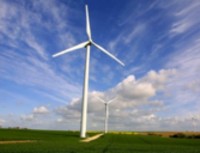Vietnam - Energy and Environment
 Vietnam’s growing economy means increasing energy demands. Industrial production is old fashioned, and the environment is many places polluted. That is why Vietnam needs climate and environment friendly technologies, which provides good future business opportunities for clean tech companies.
Vietnam’s growing economy means increasing energy demands. Industrial production is old fashioned, and the environment is many places polluted. That is why Vietnam needs climate and environment friendly technologies, which provides good future business opportunities for clean tech companies. Potential of energy efficiency and energy savings in Vietnam
There is a good potential for energy efficiency and energy savings in Vietnam, in particularly in the industry sector where 20-30 pct. of energy could be saved if modern techniques were applied. The high energy consumption in the industry sector is caused by inefficient use of energy, old-fashioned production techniques, and a lack of proper energy management. Only 15 pct. of industrial facilities in Vietnam are equipped with modern technology.
There is a particular energy efficiency potential within textiles, cement, chemicals, pulp and paper, and the food industry. The legal framework is not in place to effectively promote energy efficiency and energy savings, but new legislation is expected by end-2009.
Government policy
The Government of Vietnam is in the process of improving regulation to encourage renewable energy development and energy efficiency, but attractive subsidy arrangements are not yet in place. However, the government is very active in the field of climate change and generally very positive towards moving the economy towards a more sustainable future.
Environment and waste
Environmental concerns are increasing in Vietnam - both in industries and in the population. The large number of scooters and cars creates air pollution in the larger cities. Vietnam is experiencing an increase in waste from households, untreated waste water from industry production, and large emissions from industry. This creates a need for better treatment and handling of the environment and waste products.
Some environmental regulation is in place. However, penalties are too small to make companies seriously concerned, and regulation is not being systematically enforced. But over the last year some international companies have been severely penalized for breaking environmental regulations.
Electricity
The power industry is among the key industries which receive much attention and support from the Government. Currently, the industry is managed by Electricity of Vietnam (EVN), the state owned enterprise with monopoly and more than 50 subsidiaries under the Ministry of Industry and Trade (MOIT). EVN carry exclusive rights to electricity purchase, transmission and distribution.
The electricity production in the country has increased rapidly from 26.7 million MWh in 2000 to 77 million MWh in 2008. The annual growth rate of commercial electricity has reached 14.3% from 2000 to 2008. The rate of transmission and distribution loss has decreased for the last 10 years, from 21.7% in 2005 to 9.6% in 2008, but is still considered high. There is a need for improving transmission and distribution efficiency for instance by introducing smart metering systems.
The electricity sources include hydro power, coal fired power, oil fired power, diesel and independent power producers (IPP). The current power generation system relies mainly on hydro power and thermal power which accounts for 37% and 56% respectively of the electricity generation structure.
The authorities aim at developing power plants using new and renewable energy in areas where grid connection is impossible or costly.
Conclusion
The environment and energy situation in Vietnam provides both challenges and opportunities for the Danish clean tech industry. The general business environment in Vietnam is very good, although it is important to carefully consider approval procedures, loan arrangements, and regulation guidelines.
Vietnamese companies often prefer cheap and short-term solutions, often with technologies produced at low costs in the region. So there is a relevant challenge in convincing the Vietnamese partners of thinking long-term when investing in new technologies, and to pay the price needed for foreign technologies. Another challenge is that due to the lack of state subsidy schemes and enforcement of environmental regulation, it can prove difficult to provide financing for expensive technologies.
But the market is there. And the potential for clean tech is growing. Over the last few years some international companies have entered the market, but it is still early years. The Government supports energy efficiency in general and is well aware of the environmental concerns. This means that better regulation is under way. The demand for clean technologies is increasing by the day. And with a rapidly growing economy with increasing industry production, the need for climate and environment friendly knowhow and technologies will increase substantially in the years to come.
Soft loan programmes like the Mixed Credit Facility and financial mechanisms like the Clean Development Mechanism (CDM) might be considered for those clean tech projects that are not commercially viable. To the right you will find some useful links.
You can return to the main Market News page, or press the Back button on your browser.

